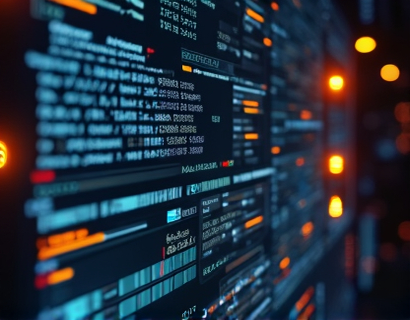AI and Crypto: Powering the Next Generation of Financial Innovation
The intersection of artificial intelligence and cryptocurrency is giving birth to a new era in financial technology. This synergy is not just a convergence of two cutting-edge fields but a transformative force that is redefining how we perceive, interact with, and innovate within the realm of digital finance. As tech enthusiasts and innovators, understanding this dynamic relationship is crucial for anyone looking to stay ahead in the rapidly evolving landscape of finance and technology.
The integration of AI into cryptocurrency is multifaceted, impacting various aspects from security and transaction processing to investment strategies and market analysis. This article delves into these areas, exploring how AI is enhancing the efficiency, security, and accessibility of crypto assets, and how this combination is paving the way for the next generation of financial innovations.
Enhancing Security with AI
One of the most significant benefits of integrating AI into cryptocurrency is the enhancement of security measures. Traditional financial systems rely heavily on static protocols and rules to detect and prevent fraudulent activities. However, these systems often struggle to keep pace with sophisticated cyber threats. AI, with its ability to learn from data and adapt to new patterns, offers a dynamic and robust solution.
AI-powered systems can analyze vast amounts of transaction data in real-time, identifying anomalies and potential security breaches with high accuracy. Machine learning algorithms can detect unusual patterns that may indicate fraudulent activity, such as unusual transaction volumes or geographically inconsistent logins. This proactive approach to security not only protects users' assets but also builds trust in the cryptocurrency ecosystem.
Moreover, AI can improve the security of blockchain itself. Smart contracts, which are self-executing contracts with the terms directly written into code, can be vulnerable to bugs and exploits. AI-driven tools can scan smart contracts for potential vulnerabilities, ensuring that they are secure before deployment. This reduces the risk of exploits and enhances the overall integrity of blockchain-based applications.
Optimizing Transaction Processing
Transaction processing is another area where AI is making a significant impact. Traditional banking systems often face delays and high transaction fees, especially in cross-border payments. Cryptocurrency, with its decentralized nature, offers faster and cheaper transactions, but scaling remains a challenge. AI can help optimize transaction processing in several ways.
First, AI can enhance the efficiency of blockchain networks by optimizing consensus mechanisms. For instance, AI algorithms can predict network congestion and adjust parameters to maintain optimal performance. This ensures that transactions are processed quickly and efficiently, even during peak usage times.
Second, AI can improve the routing of transactions. By analyzing network conditions and transaction priorities, AI can determine the most efficient path for a transaction to reach its destination. This not only speeds up the process but also reduces transaction costs, making cryptocurrency more accessible and user-friendly.
Intelligent Investment Strategies
The crypto market is notoriously volatile, making investment decisions challenging. AI is revolutionizing investment strategies by providing insights and predictions based on complex data analysis. Machine learning models can process vast amounts of historical and real-time data, identifying trends and patterns that human analysts might miss.
One of the key applications of AI in crypto investing is algorithmic trading. These AI-driven trading bots can execute trades based on predefined criteria, such as price movements, market sentiment, and technical indicators. By operating 24/7, these bots can capitalize on market opportunities that human traders might overlook due to time constraints or emotional biases.
Additionally, AI can enhance fundamental analysis by providing deeper insights into project fundamentals. Natural language processing (NLP) techniques can analyze news articles, social media posts, and other textual data to gauge market sentiment and identify potential investment opportunities. This data-driven approach helps investors make more informed decisions, reducing the risk of costly mistakes.
Personalized Financial Services
The combination of AI and cryptocurrency is also enabling the creation of personalized financial services. Traditional financial systems often treat users as homogeneous entities, offering one-size-fits-all solutions. AI, however, allows for the customization of financial products and services based on individual user profiles and behaviors.
For instance, AI can analyze a user's transaction history, spending habits, and investment preferences to recommend tailored crypto assets and investment strategies. This personalized approach not only enhances user experience but also increases the likelihood of successful investments. Furthermore, AI-powered chatbots and virtual assistants can provide real-time support and guidance, making the crypto journey more accessible and user-friendly.
Market Prediction and Analysis
Market prediction and analysis are critical for both traders and investors in the crypto space. AI algorithms can process and analyze vast datasets to forecast market trends and price movements. These predictions can be based on a variety of factors, including historical price data, trading volume, macroeconomic indicators, and social media sentiment.
One of the most advanced techniques in this area is deep learning, a subset of machine learning that uses neural networks to model complex relationships in data. Deep learning models can capture intricate patterns and dependencies that traditional statistical methods might miss. By leveraging these models, traders and investors can gain a competitive edge in the market, making more accurate predictions and informed decisions.
Moreover, AI can provide real-time market analysis, updating predictions and insights as new data becomes available. This dynamic approach ensures that users always have the most current information at their fingertips, enabling them to react swiftly to market changes.
Challenges and Considerations
While the integration of AI and cryptocurrency offers numerous benefits, it also comes with its own set of challenges and considerations. One of the primary concerns is the regulatory landscape. As AI and crypto continue to evolve, regulators are grappling with how to oversee these technologies to prevent misuse and ensure consumer protection. Compliance with regulations is essential for any AI-driven crypto solution to gain widespread adoption.
Another challenge is the ethical use of AI. Ensuring that AI systems are transparent, fair, and free from bias is crucial. For instance, AI-driven investment recommendations should not perpetuate existing market inequalities or lead to manipulative practices. Developers and organizations must prioritize ethical AI practices to build trust and credibility in the crypto ecosystem.
Technical challenges also exist, such as the need for robust infrastructure to support AI-driven applications. High computational requirements for training and running AI models can be resource-intensive, necessitating powerful hardware and efficient algorithms. Additionally, the interoperability of different AI systems and blockchain platforms is an area that requires further development to ensure seamless integration.
Future Prospects
Looking ahead, the synergy between AI and cryptocurrency is poised to drive even more innovation in the financial sector. As AI technologies continue to advance, we can expect to see more sophisticated applications in areas such as decentralized finance (DeFi), non-fungible tokens (NFTs), and cross-chain interoperability.
DeFi, for example, is already leveraging AI to create more efficient and user-friendly financial products. AI-driven lending platforms can assess creditworthiness more accurately, reducing the need for traditional credit checks. Similarly, AI can enhance the liquidity and stability of DeFi protocols by optimizing liquidity pools and risk management strategies.
NFTs, which are gaining popularity in the art and collectibles space, can benefit from AI by creating unique and dynamic digital assets. AI-generated art and personalized NFTs can offer new revenue streams and creative opportunities for artists and collectors alike. Moreover, AI can enhance the verification and authentication of NFTs, ensuring their authenticity and value.
Cross-chain interoperability is another area where AI can play a pivotal role. As different blockchain networks develop, the ability to seamlessly transfer assets and data between them becomes increasingly important. AI can facilitate this by intelligently managing cross-chain transactions, optimizing for speed, security, and cost.
In conclusion, the combination of AI and cryptocurrency is not just a technological trend but a fundamental shift in how we approach financial innovation. By enhancing security, optimizing transaction processing, enabling intelligent investment strategies, personalizing financial services, and improving market analysis, this synergy is paving the way for a more efficient, secure, and accessible financial future. As tech enthusiasts and innovators, embracing these advancements will be key to staying at the forefront of the next generation of financial technologies.










































